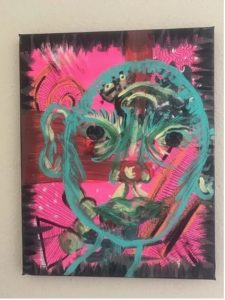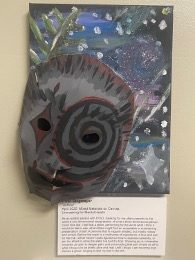Masks are a powerful symbol in art therapy, according to art therapist Jillian Bagan (she/they), who facilitated the first annual Mental Health Awareness Week Art Show at St. Paul’s Hospital.
Over the course of three weeks, Jillian guided 33 participants from across Providence Health Care (PHC) in creating 34 unique pieces of artwork. These pieces lined the fourth-floor hallway of St. Paul’s Hospital, offering an exploration of this year’s theme: Unmasking Mental Health.
Within the theme, Jillian noticed a striking duality – hardness and vulnerability.
A mask that stood out to her was a thoughtful mix of black, white, gray, red, and glitter with attached canvas, created by River (they/them) during an art group session at Foundry Vancouver-Granville. River’s piece explores the emotional weight of overused coping mechanisms, specifically feeling stuck behind a protective mask that prevents communication of someone’s inner world and vulnerabilities.
“Even in the way that I dress is a little more hard, a little bit more dark,” River says. “Who I actually am is somebody who feels very deeply and has a very deep love for life and joy and that feels way more vulnerable.”

A painting from River’s personal portfolio entitled “Annica” (2025)
They reflect that while this kind of self-protection served them well when they were younger, it has since become a barrier to forming authentic connections.
River moved to Vancouver from Ontario in 2022. After struggling to find a doctor, a friend recommended they connect with Foundry Vancouver-Granville where they could access free mental and physical health services. A year later, during a period of homelessness, River relied on support from both Covenant House and Foundry. During this time, they began attending Wellness Program activities at Foundry Vancouver-Granville including art and knitting groups which helped them build routine, set goals and make new friends.
Connecting with Foundry also fostered self-expression through art. River had always been interested in drawing and painting and even considered enrolling in art school. But after becoming overly focused on technical perfection, particularly with realism, they became frustrated and stopped creating art altogether. For years.
That changed when they found art therapy.
“Right around time I started going into art group, I got back into an expressive way of doing art,” they said. “I think it changed my relationship to art.”
Through the freedom of expression in art therapy, River discovered a healthier and more meaningful way to explore their feelings and identity.
Art therapy, explains Jillian, can help people lower their defenses, allowing deeper feelings to come to the surface to be explored. “Sometimes we get a little stuck and it feels safe to not make any changes,” Jillian said. “But if we can make art about the change, it feels less scary and less of a risk.”
River acknowledges that it is a difficult and scary time to exist – politically, economically and ecologically. Still, they stress the importance of supporting each other and finding joy despite it all. “It’s really important to focus on your mental health and develop a sense of comfort and safety and a sense of who you are, because there is so much that can knock you down.”

River’s mask, entitled “unReal” (2025), with an artist’s statement that concludes with: “Until I let go [of avoiding pain], I am hovering over life like a ghost, longing to feel my feet in the dirt.
They also emphasize the value of accessible, creative outlets: “I think the more resources we have to express ourselves through art, and have that supported and encouraged, the better… I know a lot of people who have really benefited from things like art therapy.”
Art therapy is one of many meaningful activities offered through the Wellness Program, which helps young people build creativity while connecting to nature, community and themselves. Thanks to donors like the Morris Foundation, Nicola Family Foundation, and others, wellness activities are completely free for all young people ages 12-24.
Connect with your local centre or Foundry Virtual BC to learn more.